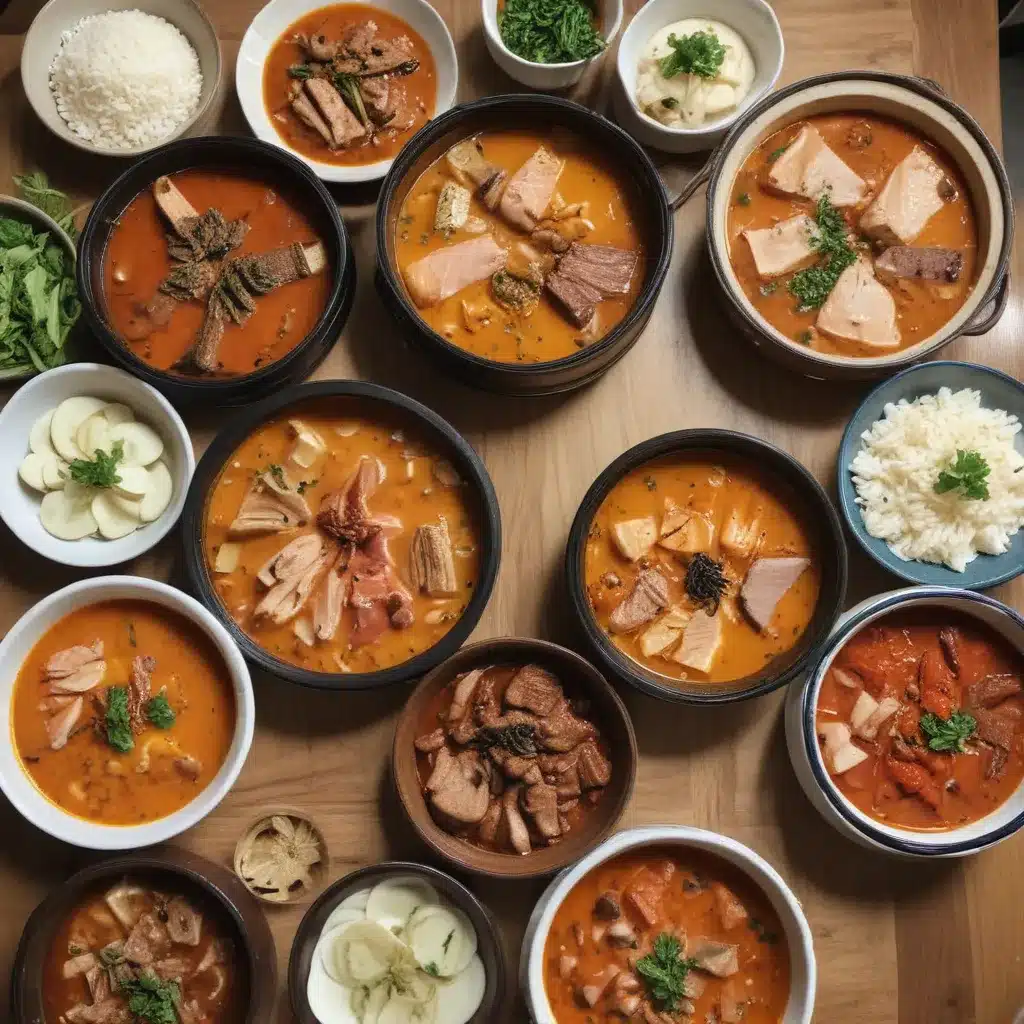
A Piping Hot Culinary Adventure
As I step into the bustling streets of Boston’s Koreatown, the air is thick with the alluring aroma of simmering broths and aromatic spices. I can’t help but feel a surge of anticipation – today, I embark on a jjigae journey, exploring the rich and complex world of Korean stews in this vibrant city.
Growing up, the comforting flavors of jjigae were a constant in my life. Whether it was the robust and fiery kimchi jjigae, the hearty doenjang jjigae, or the savory japchae jjigae, each stew held a special place in my heart and on my palate. Now, as I navigate the bustling streets of Boston, I’m determined to uncover the best of these stew-some delights.
Kimchi Jjigae: Fiery Fusion of Funk and Flavor
I begin my jjigae journey at one of Boston’s most acclaimed Korean restaurants, where the kimchi jjigae is touted as a must-try. As I take my seat, the waitress arrives with a piping hot stone bowl, the stew’s crimson hue a tantalizing invitation. I take a deep breath, allowing the complex aromas of fermented cabbage, gochujang, and savory broth to waft up to my senses.
The first spoonful is an explosion of flavors – the pungent funk of the kimchi, the heat of the gochujang, and the depth of the anchovy-based broth all harmonize in a symphony of taste. I find myself captivated by the interplay of textures, as the tender pork, soft tofu, and crisp vegetables come together in each bite.
As I delve deeper into the stew, I’m struck by the layers of complexity. The kimchi itself, a product of careful fermentation, lends a distinct tartness that cuts through the richness of the broth. The gochujang, a Korean staple, adds a smoky, slightly sweet heat that lingers on the tongue, while the scallions and perilla leaves provide a refreshing counterpoint.
What truly sets this kimchi jjigae apart, however, is the attention to detail. The chef has expertly balanced the ingredients, ensuring that no single flavor overpowers the others. It’s a harmonious dance of bold, unapologetic tastes – a testament to the culinary mastery that Korean cuisine is known for.
Doenjang Jjigae: A Soulful Journey through Fermentation
Fueled by the fiery delight of the kimchi jjigae, I set out to explore another Korean stew staple: doenjang jjigae. This earthy, umami-packed dish is often described as the “soul food” of Korean cuisine, and I’m eager to uncover its depth of flavor.
As I step into a cozy, family-owned restaurant, the aroma of simmering doenjang (fermented soybean paste) envelops me. I take a seat and eagerly await the arrival of the steaming hot bowl, my mouth already watering in anticipation.
When the doenjang jjigae is placed before me, I’m struck by its rich, deep-brown hue and the array of vibrant vegetables floating within. I dip my spoon into the broth, savoring the robust, nutty flavors that explode on my palate. The doenjang, the heart and soul of this dish, lends an umami-rich complexity that is both comforting and captivating.
As I continue to explore the stew, I discover delightful surprises – tender chunks of pork, silky tofu, and the crunch of fresh vegetables. Each component plays a vital role, contributing to the harmony of flavors and textures. The doenjang acts as the unifying force, tying everything together in a delicious symphony.
What fascinates me most, however, is the process behind the doenjang itself. This fermented soybean paste is the result of months of patient, careful curation – a labor of love that transforms simple ingredients into a culinary masterpiece. I can’t help but appreciate the dedication and artistry that goes into creating such a profound and soulful dish.
Japchae Jjigae: A Harmonious Blend of Sweet and Savory
After indulging in the robust, earthy delights of the doenjang jjigae, I decide to venture into a different realm of Korean stews – the japchae jjigae. Renowned for its unique blend of sweet and savory flavors, this dish promises to be a delightful contrast to the previous stews I’ve explored.
As I step into the restaurant, I’m greeted by the sight of a bubbling pot on the table, the sweet aroma of soy sauce and brown sugar wafting through the air. I eagerly take a seat and wait with bated breath for the server to bring forth the japchae jjigae.
When the dish arrives, I’m immediately captivated by its vibrant colors and the intriguing interplay of ingredients. Slender sweet potato noodles, tender beef, crunchy vegetables, and a glossy, caramelized sauce – it’s a true feast for the senses.
I take my first bite, and the flavors explode on my tongue. The sweetness of the brown sugar and the umami depth of the soy sauce create a delightful balance, complemented by the earthy notes of the sweet potato noodles and the savory prowess of the beef. The vegetables, ranging from crisp carrots to tender spinach, provide a textural contrast that keeps each bite interesting and engaging.
As I continue to savor the japchae jjigae, I’m struck by the sheer versatility of this dish. It can be enjoyed as a hearty main course, a flavorful side, or even as a comforting snack. The flexibility of the sweet potato noodles allows the dish to be adapted to suit various palates and dietary preferences, making it a true crowd-pleaser.
Discovering the Heart of Korean Cuisine
Through my jjigae journey in Boston, I’ve uncovered the depth and complexity of Korean stews, each one a unique and captivating culinary experience. From the fiery intensity of kimchi jjigae to the soulful richness of doenjang jjigae, and the harmonious blend of sweet and savory in japchae jjigae, I’ve gained a newfound appreciation for the artistry and skill that goes into creating these beloved dishes.
And as I savor the final bites of my japchae jjigae, I can’t help but wonder what other delicious adventures await me in Boston’s vibrant Korean food scene. One thing is certain: my jjigae journey is far from over, and I can’t wait to continue exploring the depths of this captivating cuisine.
